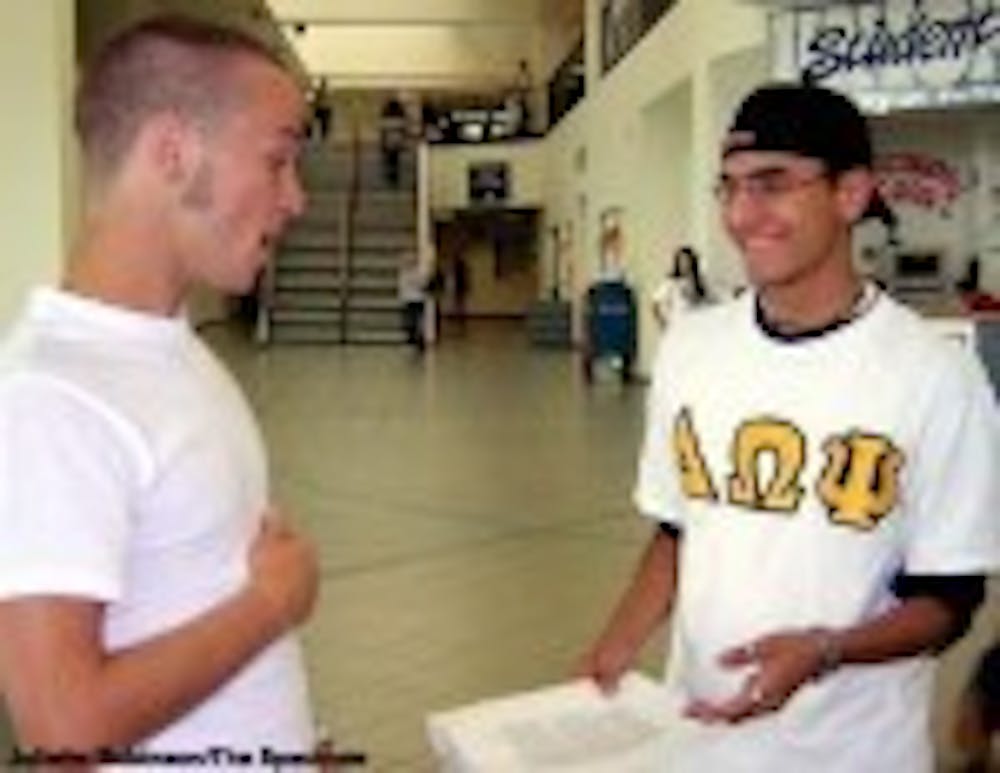For one week at the beginning of each semester undergraduates are invited to parties, meetings and a host of other free events by various Greek organizations. Some students think it is a dream come true, while others choose to decline - this is Rush Week at UB.
Rush week is a series of scheduled events where fraternities and sororities open themselves to the undergraduate body, in search of prospective members.
Joey Hochberg, a senior business major and a member of the Phi Kappa Psi fraternity, said prospective pledges are invited to "meet the brothers, go bowling and go-cart racing in the winter," during Rush Week.
According to Hochberg, the goal of rush week is, "to give possible new members the idea of what brotherhood is, what the organization can do for them and what they can do for the organization."
Michael Bruckner, a senior business major and member of the Pi Lambda Phi fraternity, said Rush Week is all about the prospective students.
"Rush week is a chance where students are eager to explore what Greek Life has to offer," said Bruckner. "The overall process of rush is for the rushee to see what organization they want to pursue."
While rush is mainly about looking for prospective members, some Greeks said it is also important for the reputation of the fraternity or sorority.
Kheang Te, a graduate student studying business administration and a former brother of the Lambda Phi Epsilon fraternity, said that a successful rush program could result in campus-wide recognition, which is crucial for a Greek organization to survive.
Te said that Lambda Phi Epsilon's annual welcome-back party is one of their trademark Rush events and brings recognition to his organization.
"It is a big party where a lot of freshmen come out," said Te. "It's one of the reasons why our name is so big on campus."
Many Greek organizations go to great lengths to spread word of their rush programs. Most organizations can be seen handing out their rush schedule or approaching students in the Student Union and in the dorms.
Rashawn Deberry, a junior economics major, said this process is not necessarily beneficial for the reputation of Greek organizations.
"If students really wanted to be in a fraternity, they should go find the fraternity," said Deberry. "Frats shouldn't put themselves out there like that for everybody - they should want the elite. Rush events water down the fraternities."
Amanda Moccaldi, a senior health and human services major and member of the Alpha Phi sorority said rush offers many social opportunities for new students.
"(Rush) is a good way to meet new people, and if someone is looking for a fun way to make the transition to campus, rushing is a great way to do it," said Moccaldi.
According to Pamela Stephens-Jackson, the university liaison for the Office of Greek Affairs, if a student is interested in joining a fraternity or sorority, rush is the place to begin gathering information.
"People aren't blindly joining an organization; they get to meet members," said Stephens-Jackson. "The equivalent of not going through rush week (and deciding to pledge) is like an arranged marriage."
While fraternity and sorority information booths seem to take over the Student Union during Rush Week, some students have no desire to get involved in Greek life.
"I'm not interested," said senior communication major Jace Christner. "All those guys think they're so bad-a**."
Some students, though not involved in Greek life, think that rush can have a positive effect on student life.
"It makes the campus more active," said Nick Botkins, a senior aerospace engineering major. "I don't mind it, I have a lot of friends that are in fraternities, and overall I think it is a good experience."
Sindy Weisinger, a senior health and human services major and sister in Alpha Phi, agreed.
"Even if you do not choose to join a sorority or fraternity, it is still a great way of meeting new people," she said.
Dave Rutsky, a senior accounting major and a brother of Pi Lambda Phi, said rush is more complicated than simply scheduling different events. The fruits of the organization's labor can only be measured at the conclusion of rush events - if rushees return as prospective pledges, he said..
"Students generally walk out of a rush event satisfied, but you never truly know what they are thinking," said Rutsky.





